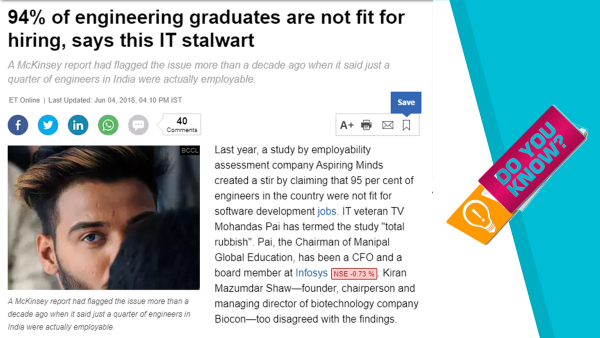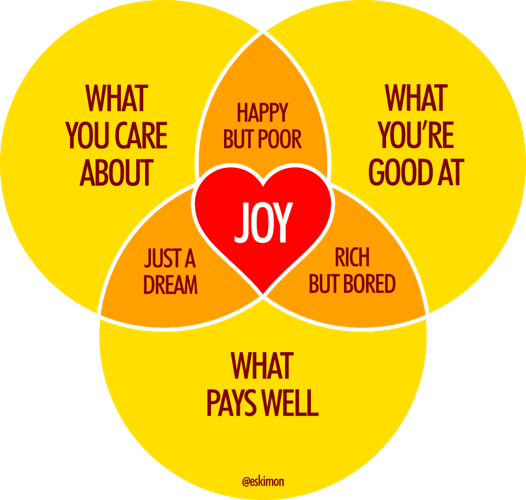Career Blogs

Career Planning: Why a professional approach is important to get better results.
Do you feel stuck in your career? Maybe you’ve achieved the salary and title you always wanted, but something is still missing. Or maybe you're in a career where you have more to offer, but aren’t being granted the opportunity to do so.

53.79 % of students are unemployable as per India Skill Report 2019.
As per survey 94% of engineering graduates were not fit for hiring by IT firm.


As per the Economic Times survey (May 2018), 80 percent of employees dissatisfied with their jobs.
60% of employees in India were found to be dissatisfied with their current jobs and 80% were seeking a job change in a survey conducted by Times Jobs.

The reason behind highlighting this news is not to threaten people but to force them to realize the situation and the findings for such adverse situations was noticed as a GAP between aspiration Vs reality in career.
Who is going to take responsibility for this? Governments, Parents, Individuals, Education system, or someone else? When it comes to governments, they have rolled out the Skill India campaign and a lot more initiatives have taken a shape. When it comes to the education system, they started extracurricular activity to ensure children should learn the necessary skills. When it comes to individuals, they are into the hands of their parents to decide a career. When it comes to parents, they are confused, overconfident, or unaware of the facts and make decisions based on opinions or past experiences. All of them are correct and doing their best to improve employability and skills to get more jobs. But when delivery is high against the demand and employers are looking for the best suitable candidates, Individuals need to suffer, is it correct? No, not at all. If you are aware and prepared for the future situation you can customize your education and learn more skills related to the sector which is going to grow. Second, if you learn multiple skills and you can’t get suitable employment, you can work independently. Now when it comes to career planning, everyone is confident about their strategy of career planning at their level but still the satisfaction rates are not indicating many improvements on board. Just imagine, we are living in a country, where if we plan to invest 5K in mutual funds and research goes for a month. We plan to buy a mobile and review at various site. We plan to have dinner and go for an online review. Even for selecting a suitable college or school, we do enough research. When it comes to a career plan, do we research with experts or data? No majority of parents go with the crowd or with their personal aspiration, they don’t take professional help on this particular matter. Why they don’t see value getting professional help for career planning. The majority of parents see career planning as a stream selection process for higher education, rather they forget that career planning is not education planning but it is the preparation to live a desired life for the next 60 years. Any mistake here will not allow a child to take a ‘U’ turn in life and he will lose his life in-crowd. 2nd concern is the family belief, once a child has completed his education and got their job, our job is done and rest is a child’s luck and effort which will decide their future success or life. Am I talking harshly or this is true? No sir, you are not free from your responsibility but his career is also linked to your life if he is not happy you will be under pressure because society will question your parenting. Of all the decisions we make in our lifetime, choosing a career is one of the most important ones. But when we make this decision, do we consider the long term plan, goals, or objective? As far as I know, the majority of people will say ‘NO’. Then the question arises, why people are investing lakhs of crore of rupees on education when they are not confident about the return on investment? Are they uneducated or do not know the planning?They are not considering it important and feeling confident enough and plan a career on intuition, opinion, or past experiences.
Sometimes our intuitions may work, and we could end up in a career that keeps us happy. But often, in the long run, it turns out far from being fulfilling. We might be performing well, but not satisfied. We might find that there is so much more we can do with our capacities but that the career seems to limit. And in worse case scenarios, we might feel that the career is unsuitable for us due to a misfit between our capabilities and what the career demands.
Why take chance when we can have guidance using various tools after all this is the question of a career which is going to last for 40 years long. Can we think of walking on a path for 40 years without knowing the destination?
That’s why professional guidance is like a doctor or architect who advises you on your health planning or house building. Can you build your house on your own if you are not an Architect? If at all you build it, how it will look like, or what about the quality? The same way an unplanned career leads to a stressful and low-quality life.
Career planning is the process of proactively taking steps to further refine yourself in your chosen occupation to ensure you love what you do, and when you love what you do will take you to greater height in life.
A career plan is an individual’s choice of occupation, organization, and career path. Career planning encourages individuals to explore and gather information, which enables them to synthesize, gain competencies, make decisions, set goals and take action. It is a crucial phase of human resource development that helps the employees in making a strategy for work-life balance.
According to Schermerhorn, Hunt, and Osborn, ‘Career planning is a process of systematically matching career goals and individual capabilities with opportunities for their fulfillment’.
At the outset, an important issue to clarify here is that strictly speaking career is a set of related occupations. So, against traditional wisdom one may pursue multiple careers in his/ her lifetime. The trend these days is for individuals to pursue multiple careers in their lifetime (some research suggests on an average around 2-3).
This is being called the new career paradigm where gigs are becoming popular and the need for continuous learning is increasing by leaps and bounds. Given the above trends and accentuated by the fast-changing world of work, the need for career planning is becoming increasingly important, with more agility and frequent interventions required. So, in strategic planning terms we may have to think through your strengths, weaknesses (internal assessment), opportunity, threats (environmental scan), and devise actionable career plans more often. So as we call it there is a need for career planning across one’s lifetime now. A typical approach in career planning follows a defined process. We work with parents and students for a detailed career planning, affordable which you can use for the emerging career planning needs across your lifetime.

Career planning can help you in the following ways:
Know yourself: It helps you to identify your strength, ability skills, and interest. In life, these are the resources that will be used by individuals to perform necessary work or action.
Figure out your goals: It becomes easier to figure out personal objectives and goals through career planning. It is always better to chase your goals instead of working aimlessly.
Save time and energy: Career planning helps you avoid going after a profession that does not align with personal goals and abilities. The earlier you plan, the better it is.
Make confident choices: Career planning puts you in the driver’s seat in your career journey and lets you make confident choices for your future endeavors.
Focus: You will be able to determine a clear path to follow with the help of career planning. It helps you avoid feeling lost and lets you focus on the right aspects. Plan your career in consultation with a professional career counselor or planner to ensure you should live for success, not for survival.
"If you don't design your life plan. Chances are you will fall into someone else's plan. And guess what they have planned for you not much." - JIM ROHN Sunil Singh (Career Mentor & Coach)


